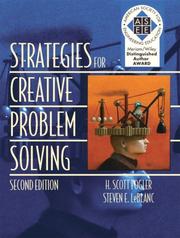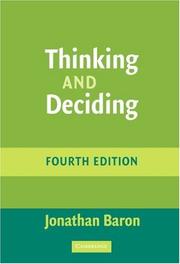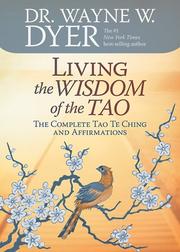| Listing 1 - 10 of 575 | << page >> |
Sort by
|
Periodical
Year: 2008 Publisher: [Toronto, Ont.] : [York University],
Abstract | Keywords | Export | Availability | Bookmark
 Loading...
Loading...Choose an application
- Reference Manager
- EndNote
- RefWorks (Direct export to RefWorks)

ISBN: 9780130082794 0130082791 Year: 2008 Publisher: Upper Saddle River (N.J.): Prentice Hall,
Abstract | Keywords | Export | Availability | Bookmark
 Loading...
Loading...Choose an application
- Reference Manager
- EndNote
- RefWorks (Direct export to RefWorks)
Book
ISBN: 2807348742 2804179370 Year: 2008 Publisher: Brussels, Belgium : De Boeck Supérieur,
Abstract | Keywords | Export | Availability | Bookmark
 Loading...
Loading...Choose an application
- Reference Manager
- EndNote
- RefWorks (Direct export to RefWorks)
L'ouvrage présente d'une manière synthétique l'état des connaissances fournies par les recherches conduites dans les domaines de la psycholinguistique et de la psychologie cognitive de la lecture et du traitement du texte. Il propose une introduction générale aux principaux modèles du fonctionnement cognitif de l'apprenant dans les activités de lecture, de compréhension et de production d'écrit. Il permet ainsi de concevoir des activités d'aide et de remédiation aux difficultés rencontrées par les élèves lors des apprentissages fondamentaux liés à la maîtrise de l'écrit. Il rend possible le dialogue entre le psychologue et le pédagogue également confrontés aux difficultés des élèves face à la maîtrise de l'écrit.
Book
ISBN: 9460911471 Year: 2008 Publisher: Rotterdam, The Netherlands : Sense Publishers,
Abstract | Keywords | Export | Availability | Bookmark
 Loading...
Loading...Choose an application
- Reference Manager
- EndNote
- RefWorks (Direct export to RefWorks)
Threshold Concepts within the Disciplines brings together leading writers from various disciplines and national contexts in an important and readable volume for all those concerned with teaching and learning in higher education. The foundational principle of threshold concepts is that there are, in each discipline, ‘conceptual gateways’ or ‘portals’ that must be negotiated to arrive at important new understandings. In crossing the portal, transformation occurs, both in knowledge and subjectivity. Such transformation involves troublesome knowledge, a key concern for contributors to this book, who identify threshold concepts in their own fields and suggest how to deal with them. Part One extends and enhances the threshold concept framework, containing chapters that articulate its qualities, its links to other social theories of learning and other traditions in educational research. Part Two encompasses the disciplinary heart of the book with contributions from a diversity of areas including computing, engineering, biology, design, modern languages, education and economics. In the many empirical case studies educators show how they have used the threshold concept framework to inform and evaluate their teaching contexts. Other chapters emphasise the equally important ‘being and becoming’ dimension of learning. Part Three suggests pedagogic directions for those at the centre of the education project with contributions focusing on the socialisation of academics and their continuing quest to be effective teachers. The book will be of interest to disciplinary teachers, educational researchers and educational developers. It also is of relevance to issues in quality assurance and professional accreditation.
Critical thinking --- Thought and thinking --- Study and teaching (Higher)

ISBN: 9780521680431 9780521862073 Year: 2008 Publisher: Cambridge : Cambridge university press,
Abstract | Keywords | Export | Availability | Bookmark
 Loading...
Loading...Choose an application
- Reference Manager
- EndNote
- RefWorks (Direct export to RefWorks)
Book
ISBN: 9780141015477 0141015470 Year: 2008 Publisher: Harmondsworth: Penguin books,
Abstract | Keywords | Export | Availability | Bookmark
 Loading...
Loading...Choose an application
- Reference Manager
- EndNote
- RefWorks (Direct export to RefWorks)
Book
ISBN: 9087902948 Year: 2008 Publisher: Rotterdam ; Taipei : Sense Publishers,
Abstract | Keywords | Export | Availability | Bookmark
 Loading...
Loading...Choose an application
- Reference Manager
- EndNote
- RefWorks (Direct export to RefWorks)
Global and local studies show that the present growth-based approach to development is unsustainable. If we are serious about surviving the 21st century we will need graduates who are not simply 'globally portable' or even 'globally competent', but also wise global citizens, Globo sapiens. This book contributes to what educators need to know, do and be in order to support transformative learning. The book is based on work with large, socially and culturally diverse, first-year engineering students at an Australian university of technology. It shows that reflective journals, with appropriate planning and support, can be one pillar of a transformative pedagogy which can encourage significant and even transformative attitude change in relation to gender, culture and the environment. It also offers evidence of improved communication skills and other tangible changes to counter common criticisms that such work is "airy-fairy" and irrelevant. The author combines communication theory with critical futures thinking to provide layered understandings of how transformative learning affected students’ thinking, learning and behaviour. So the book is both a case-study and a detailed response to the personal and professional challenges that educators all over the world will face as they try to guide students in sustainable directions.
College teaching. --- Reflective learning. --- Critical thinking.
Book
ISBN: 1847062970 9781847062970 Year: 2008 Publisher: New York Continuum
Abstract | Keywords | Export | Availability | Bookmark
 Loading...
Loading...Choose an application
- Reference Manager
- EndNote
- RefWorks (Direct export to RefWorks)
Book
ISBN: 9087903782 Year: 2008 Publisher: Rotterdam, The Netherlands : Sense Publishers,
Abstract | Keywords | Export | Availability | Bookmark
 Loading...
Loading...Choose an application
- Reference Manager
- EndNote
- RefWorks (Direct export to RefWorks)
This book offers a detailed examination of imagination in learning. Teachers working with the ideas of Imaginative Education in their classrooms provide examples that cover multiple curricular areas and span elementary through secondary school contexts. “Imagination” has moved in recent years from being considered some kind of educational frill to a recognized main workhorse of teaching and learning. It is this new perspective that this book celebrates and exemplifies. The book is divided between teachers’ and researchers’ voices, both exploring a range of ways in which the imagination can be used in everyday classrooms to enhance learning and increase the satisfactions of teaching. This book demonstrates how engaging the imagination lies at the core of effective education.
Creative thinking. --- Imagination. --- Learning, Psychology of.

ISBN: 9781401921491 Year: 2008 Publisher: Carlsbad Hay House, Inc.
Abstract | Keywords | Export | Availability | Bookmark
 Loading...
Loading...Choose an application
- Reference Manager
- EndNote
- RefWorks (Direct export to RefWorks)
Adaptability (Psychology) --- Lifestyles --- Thought and thinking --- Laozi.
| Listing 1 - 10 of 575 | << page >> |
Sort by
|

 Search
Search Feedback
Feedback About UniCat
About UniCat  Help
Help News
News